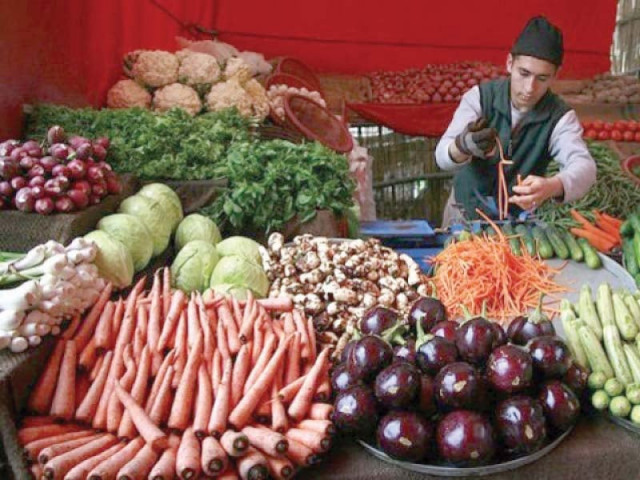PTI govt to amend laws to rein in prices of essential items
Asad Umar chairs price monitoring meeting amid criticism over high inflation

The committee was informed that volatility in prices of perishable items, specifically tomato, onion, gram and pulses, was primarily due to seasonal variations, which have now subsided. PHOTO: FILE
Finance Minister Asad Umar chaired the National Price Monitoring Committee (NPMC) meeting amid growing criticism against the government over the skyrocketing inflation. The meeting had been convened to review price control mechanisms and check availability of essential food items ahead of Ramazan.
The NPMC decided that laws would be reviewed to ensure that price control mechanisms proactively focused on cartelisation, hoarding and undue profiteering, according to a statement issued by the finance ministry after the meeting.
It added that the meeting reviewed prices of perishable and non-perishable food items, particularly 28 essential kitchen items. The committee was informed that volatility in prices of perishable items, specifically tomato, onion, gram and pulses, was primarily due to seasonal variations, which have now subsided.
Inflation in March 2019 went up 9.4%, which was the highest in the last over five years. The sudden jump of 1.4% in just one month panicked many, causing alarm over prospects of stagflation in the country.
However, the government was of the view that food inflation contributed almost one-third to the inflation index and tomato alone contributed one-fourth to the increase in inflation. The combined impact of increase in gas and tomato prices on the 9.4% inflation was 42.5%.
It is not for the first time that federal authorities have decided to control inflation through legal means. In 2013, the Pakistan Muslim League-Nawaz (PML-N) government had also decided to introduce a law to restore the executive magistracy system aimed at bringing price stability.
During General Pervez Musharraf’s tenure, the magistracy system had been abolished that created a vacuum in price control mechanisms.
The Competition Commission of Pakistan had been established with an aim to break monopolies and ensure fair play. However, over a period of time, the organisation has been rendered ineffective as its decisions against big cartels have remained unimplemented.
The NPMC took stock of supply and prices of food and pharmaceutical items. The finance minister directed that market committees may be made more proactive so that they could effectively monitor prices and check any hoarding across the country.
It was also agreed to reduce price disparity among provinces through an integrated market mechanism.
The committee was informed that the Sensitive Price Indicator (SPI), which monitors mostly kitchen items, had been showing a sharp decline for the last two consecutive weeks in March 2019, which suggested that prices of these items in the market were on a downward trajectory.
The meeting decided that a strong forecasting mechanism would be put in place to ensure availability of essential food items for the coming three to six months in consultation with the provincial governments.
Monthly meetings of NPMC will be held regularly to review supply and prices of all commodities and take timely measures to avoid any shortage in the country. The Utility Stores Corporation assured NPMC that the government’s Ramazan package would be implemented to ensure availability of sufficient commodities at affordable prices.
The meeting agreed that Sasta Bazaars, Sunday Bazaars and fair price shops would be increased throughout the country to ensure sufficient availability of commodities for the common man at affordable prices.
Umar said Prime Minister Imran Khan would chair a meeting to further review the supply and prices of food and pharmaceuticals in the country on Monday. The ministries concerned will submit to the prime minister short and medium-term policy recommendations as well as structural measures needed to ensure smooth supply and stability in prices.
Another reason behind the spike in year-on-year inflation was the hike in prices of essential medicines. On a summary of the Ministry of National Health Services and Regulations, the federal government had allowed an increase in prices of medicines.
Published in The Express Tribune, April 5th, 2019.
Like Business on Facebook, follow @TribuneBiz on Twitter to stay informed and join in the conversation.



















COMMENTS
Comments are moderated and generally will be posted if they are on-topic and not abusive.
For more information, please see our Comments FAQ